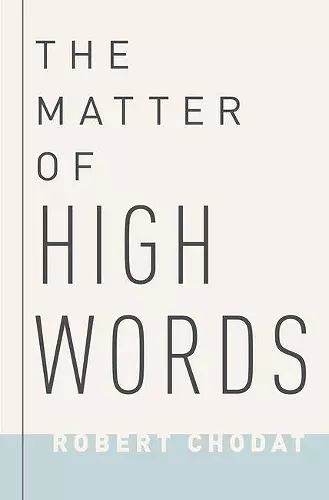The Matter of High Words
Naturalism, Normativity, and the Postwar Sage
Format:Hardback
Publisher:Oxford University Press Inc
Published:12th Oct '17
Currently unavailable, and unfortunately no date known when it will be back

In a world of matter, how can we express what matters? When the explanations of the natural sciences become powerfully precise and authoritative, what is the status of our highest words, the languages that articulate our norms and orient our lives? The Matter of High Words examines a constellation of American writers who in the decades since World War II have posed these questions in distinctive ways. Walker Percy, Marilynne Robinson, Ralph Ellison, Stanley Cavell, and David Foster Wallace are all self-consciously post-WWII authors, attuned to the fragmentation and skepticism that have defined so much of the literary and critical culture of the last century and more. Yet they also attempt to reach back to older forms of thought and writing that are often thought to have dried up-the traditions of prophecy, of wisdom literature, of the sage. Working within this dual inheritance, these authors are drawn equally to both art and argument, "showing" and "telling," shifting continually between narrative and discursive genres. In their essays they act as moralists, promoting the broad, abstract concepts that might inspire action in the face of naturalistic reduction: community, family, courage, fraternity, marriage, friendship, temperance, judgment. In their narratives, they offer particular lives in particular settings, thick descriptions that give flesh to such high words. Rarely do these movements between genres generate a tidy equilibrium; where their essays speak of cooperation and redemption, their narratives display alienation, loss, and failure. But in pursuing such risky, unorthodox strategies, these postwar sages are not only able to challenge some of the dominant naturalistic theories of the last several decades: cognitive science, neo-Darwinian theory, social science, the fact-value divide in analytic philosophy. Through five chapters of detailed analysis and close reading, Chodat explores the question of whether vocabularies of ought and ought-not can still emerge today, and how these concepts might be embodied, and whether such ideas might be found in things.
Summing Up: Recommended. Graduate students, researchers, faculty. * C. Psenicka, CHOICE *
Robert Chodat's new book is an intellectual feast of multi-disciplinary learning and engagement that offers a powerful challenge to the still most prestigious current of modernist aesthetics - the primacy of experience and sensuous particularity - which celebrates mute showing over discursive telling. He brings to the fore a vital counter-tradition of the post-war 'sage', offering fresh configurations, scrupulous analysis, and passion for bringing philosophy and literature into conversation. The result is a much-needed, stirring, and important book. * Ross Posnock, Columbia University *
Chodat's book is both enormously erudite and original. Offering a brilliant new view of some of the best American literature following the Second World War, it makes wonted notions regarding high- and postmodernism alike utterly obsolete...This book is a must read for anyone interested in understanding contemporary philosophy and literature. * Amir Eshel, Stanford University *
Robert Chodat's new book tracks the twinned impulses of five major post-War American writers to reclaim such high terms of self-responsibility as duty, honor, justice, courage, and love but also to register the disruptive particulars that haunt such reclaimings. In this way he shows compellingly how the novel and philosophy in their modulating mutual inflections both enact and register the continuing vicissitudes of modern reflective thought. * Richard Eldridge, Swarthmore College *
For those working in the humanities and social sciences who have felt compelled to question the pervasive consensus that 'high ideas' - abstract concepts and values - can only distort and injure; that beings and environments to which we apply such ideas are fundamentally unrepresentable much less knowable; and that such ideas are therefore illegitimate bases for human action, both individual and collective, Robert Chodat's new book should offer a welcome tonic...This book delivers a powerful challenge to the prevailing theoretical commitments of nearly six decades of literary scholarship. * Jennifer Ashton, University of Illinois at Chicago *
ISBN: 9780190682156
Dimensions: 155mm x 236mm x 31mm
Weight: 612g
354 pages